Main navigation
- Graduate Students
- Faculty & Staff
- General requirements
- Preparation of a thesis
- Initial Thesis Submission
- Thesis examiners
- Evaluation of written thesis
- Thesis examination failures
- Doctoral oral defence
- Final Thesis Submission
- Thesis Writing and Support Resources
- Letters of Completion/PGWP

Evaluation of a Written Thesis
Examiners are asked to evaluate the thesis in myThesis, according to the criteria in the respective thesis examiner report for a Master's or Doctoral thesis. For an example of the criteria, please see the forms: see: Master's Examiner report form ; Doctoral Examiner report form (note these forms are now integrated in myThesis).
Examiners provide an overall judgment of 'passed' or ‘not passed’, in addition to a written report. For Master's students, this evaluation determines whether or not the thesis is ready for final submission, even if minor changes are recommended. For Doctoral candidates, this evaluation determines whether or not the candidate is ready to proceed to the oral defence.
If the thesis meets the general criteria for the degree sought, as well as those listed on the examiner's report form it should be evaluated as 'Passed', even if some changes are recommended.
If the overall judgement is 'Passed', examiners are asked to provide:
- A report that includes any recommendations for minor revisions to the thesis (i.e., stylistic or editorial changes that can be completed in three weeks or less).
- For doctoral theses, External Examiners who will not be at the oral defence must also provide a list of questions to be asked of the candidate at the oral defence.
An evaluation of 'Not Passed' should be given if:
- the need for a new study, experimentation, or significant additional research or reformulation.
- the need to address major problems with the presentation of the work. Stylistic or editorial changes are not normally considered to be major revisions, but if the quality of the presentation is so poor that extensive rewriting is required, the thesis should not be passed.
- At least one of the Criteria for the Evaluation of the Thesis (see Master's Examiner report form ; Doctoral Examiner report form ) is judged as unsatisfactory.
Examiners are asked to identify required changes clearly in their reports. The supervisor or another designated person will ensure that the student corrects the thesis and that it appropriately reflects the examiners' suggestions for revisions prior to re-submission of the thesis.
The candidate will normally revise and re-submit the thesis for re-assessment, usually by the same examiner. If/when review of the revised thesis is required, the Thesis Unit will contact the initial examiner to determine their availability. In rare cases, a revised thesis may be sent to a new examiner if the first examiner is not available to re-examine the thesis. For more, please see Thesis examination failures.
If the revised thesis is again ‘not passed’, the student will be withdrawn from the University unless the decision is reversed through an appeal to the Hearing Committee (Bias, Error, or Misrepresentation ).
This work is licensed under a Creative Commons Attribution Non-Commercial 4.0 International License . Graduate and Postdoctoral Studies, McGill University .
Department and University Information
Graduate and postdoctoral studies.
The Graduate College » Faculty/Staff » Graduate Handbook » Master's Degree Policies and Procedures » Theses and Capstones
Culminating Experience: Theses and Capstones
Every degree requires a culminating experience that is designed to integrate and apply the knowledge and learning gained from the curriculum, and demonstrate mastery of the subject matter in the degree. A master’s thesis is required by some programs, and a master’s capstone project/experience is required in others. Each master’s degree student undergoes an individual evaluation process at the end of their program.
Thesis Preparation, Evaluation and Submission Process
Preparation of a thesis demonstrates the student’s ability to communicate and to evaluate critically. Information about preparing an electronic thesis is available on the Graduate College website. The student should consult with their program office for additional forms required other than what appears on the graduation checklist.
A student must note any relevant deadlines defined by their program, and work with their program leadership to form a thesis committee composed of at least two UC faculty members, at least one of whom must be a member of the university graduate faculty . The thesis committee can guide the student in their exploration of the topic of the master’s thesis, and is responsible for final evaluation of the thesis. The student must submit the completed thesis to the thesis committee for critical evaluation, by the deadline required by the program or their thesis committee. Students who have written a thesis are expected by the Graduate College per their program requirements to make a public announcement of their thesis defense, including time, date, and title of the public presentation. The format for thesis evaluation is decided by the academic unit offering the graduate degree.
Faculty with emerit status may remain on the committee if they were members when the proposal was accepted and were full-time tenured, university graduate faculty. A faculty member originally on a student’s committee who leaves UC to take an academic position elsewhere may also continue to serve on the student’s committee if both the faculty member and the student agree to continue the relationship. However, neither an emerit professor nor a faculty member from another institution may serve as chair of the committee, since they are no longer eligible to be university graduate faculty.
Once a thesis has been approved by their committee, the candidate for the master’s degree must submit an electronic thesis by following the current instructions online at the Graduate College's Graduation page . Be careful to adhere to any deadlines for submission, or graduation will be delayed.
Capstone Process
Master’s students who are not required to complete a thesis should consult their academic programs about the requirements and procedures for the capstone experience in their programs.
In some programs, the final capstone event may be in the form of a comprehensive exam or research project; in others, the final evaluation may appropriately be a recital, performance, or exhibition. The specific nature of the final evaluation is determined by the academic unit offering the master’s degree program, but it must include evaluation by full-time faculty at the University of Cincinnati. If questioned, the appropriateness of a final evaluation will be decided by the University Graduate Council.
Rules for evaluating a Master's thesis
The Academic Regulations (in French only) set out the general framework for evaluating Master's or Doctoral theses and mandate the dean of the Faculty of Graduate and Postdoctoral Studies (FESP) to establish and publicize the rules, standards, and procedures.
Body responsible for evaluation
FESP is responsible for the evaluation process; the dean has the authority to make the final decision in the event of a dispute. In order to guarantee the evaluation committee is independent, neutral, and objective, FESP coordinates all steps in the evaluation process.
- It officially appoints the Master's thesis examiners.
- It ensures that you, your program director, and your evaluation committee receive all required information (neither you nor your research supervisor have any contact with the examiners during the evaluation process).
- It transmits the approved version of the initial submission to the members of the committee.
FESP makes certain that the examiners have enough time to review the Master's thesis while also ensuring that you receive your evaluation in a timely manner for the pursuit of your studies or career goals.
Evaluation committee
An evaluation committee consists of ex-officio examiners (research supervisor and co-supervisor) and designated examiners selected on the basis of their expertise in the field to provide an outside perspective on your work. Master's thesis evaluation committees have a minimum of three members.
In cases where the research supervisor is also the program director, the vice dean of studies at the faculty in question assumes program director duties for the purposes of the Master's thesis.
If you have a co-supervisor, FESP recommends the appointment of a fourth examiner.
If there is a preliminary review, the reviewer is usually, but not necessarily, a member of the evaluation committee.
Examiner appointments are subject to the following conditions:
- Potential candidates must hold a master’s degree in the relevant field (or a related field).
- The potential candidate must have no actual or potential conflict of interest with you that could interfere with their evaluation.
The committee must include an examiner who is in a position to provide an outside perspective on yourMaster's thesis and has not participated or collaborated actively in your work (e.g., by having contributed to a paper included in the Master's thesis).
Approval for initial submission
The initial Master's thesis submission requires three additional approvals:
- The program director must certify that your file is complete and valid so that you can obtain your diploma once the evaluation process is complete.
- The supervisor has 4 weeks to approve the Master's thesis for submission or request corrections.
- FESP must confirm that the format of the document meets presentation and publication standards.
Individual report
Each examiner evaluates the Master's thesis independently, without consulting or discussing with the other committee members.
Review times vary depending on the evaluation start date:
- An additional delay is added from November 22, due to the Holiday season.
- Summer period: 8 weeks (May 15 to August 15)
Please note: An additional two weeks is added for Master's theses exceeding 500 pages, regardless of the time of the year.
Each examiner writes an evaluation report and grades the Master's thesis as follows:
- Final submission is recommended.
Unacceptable
- If the examiner feels that you have the necessary abilities, you are invited to submit a new version of the Master's thesis for a second initial submission and a second evaluation by the same committee.
- The examiner recommends that the Master's thesis be rejected.
The examiner’s decision is considered final once their report is submitted to FESP. The report remains confidential until the committee’s decision is rendered and communicated to you.
Committee decision
Individual evaluations are compiled to determine whether the Master's thesis is accepted (invitation to proceed with final submission), returned to you for major revisions, or rejected.
Master's thesis is accepted
- FESP transmits the committee’s decision, forwards the examiners’ evaluation reports, and invites you to proceed with the final submission.
- You have 8 weeks to make final corrections to the document under the supervision of your supervisor.
- The research supervisor approves your Master's thesis for final submission.
- FESP issues final approval so that the master’s degree can be awarded.
- Master's theses that receive a unanimous grade of “excellent” (or “excellent” from three examiners and “very good” from the other examiners), are entered on the FESP Honour List.
The Master's thesis is unacceptable in its current state, but the committee will allow you to submit a new version.
- The committee meets to determine requirements for the new version, which will undergo a second evaluation.
- Each of the requirements must be agreed to by at least two examiners.
- FESP informs you of the committee’s decision and forwards the examiners’ evaluation reports as well as the committee report, which gives a deadline, the list of corrections requested, and the name of the person responsible for supervising them.
If you don’t submit a new version of the Master's thesis by the committee’s deadline, a “fail” grade will be entered in your file.
Master's thesis is rejected
- The evaluation committee may meet, if one of the examiners so requests, before FESP informs you of your result.
- FESP transmits the committee’s decision, forwards the examiners’ evaluation reports, and informs you that you have a right of appeal if you can show circumstances or make arguments that invalidate the evaluation process. The final decision of the committee cannot, in itself, be appealed (Academic Regulations 4.47).
- If you don’t exercise your right to appeal within 10 days, a “fail” grade will be entered in your file.
In the event of a discrepancy between the French and English texts, the French version prevails.
Other topics

Submission and evaluation
Steps to submission.
Students should be aware that in each term there is a cut-off date for submitting the thesis for evaluation. If the student misses this date, there are financial and possibly other consequences. Students are advised to verify applicable deadlines.
Prior to submitting the thesis, the student must have fulfilled all of the program's requirements and have submitted the list of examiners.
If the student is in a cotutelle arrangement, he or she should read their cotutelle agreement and check with the academic units of each institution regarding the submission procedures for both universities.
Examiners nomination arrow_drop_down
The list of examiners is proposed by the student in consultation with his or her supervisor. The student must ensure that the nomination form of the examiners has been completed and forwarded using a Service request in his or her Candidate Center (uoZone). The list must be submitted at least one month before the filing date. Any delay in the submission of this form will delay the entire evaluation and defence process and may have financial consequences since the submission of the thesis can not be accepted if the list of examiners has not been submitted .
- Form - List of examiners for the evaluation of the thesis (PDF)
PhD thesis external examiner arrow_drop_down
Each PhD thesis has an external examiner in addition to the internal examiners. The proposed external examiner should be at arm’s length from the PhD candidate, from the thesis research and from the thesis supervisor. Examiners must be seen to be able to examine the student and the thesis free of substantial conflict of interest.
To enable the faculty to check that external examiners have appropriate expertise and to validate that they are not in conflict of interest, a curriculum vitae must be provided for each proposed examiner. The curriculum vitae should include, the rank, supervisions and a list of publications.
In signing the form with the names of the proposed examiners, the director of the academic unit or delegate is indicating that, to the best of their knowledge, no conflict of interest exists.
For more information, or if there is any question about whether a potential external examiner is at arm’s length, please contact your faculty.
- Examples of conflict of interest
Submission for evaluation arrow_drop_down
When submitting a thesis for evaluation, the student must be enrolled. It is important that the student submits the final draft to his or her thesis supervisor sufficiently early in the term. By doing so the supervisor can read it, provide feedback and deliver it to the student in a timely manner. Consequently, the student can then make the latest revisions or corrections and submit his or her thesis for evaluation, after having obtained approval from the supervisor that the thesis is ready for evaluation .
Thesis submission method arrow_drop_down
The student has to submit an electronic copy of the thesis in the Candidate Center accessible through uoZone .
Statement of the thesis supervisor arrow_drop_down
The supervisor acknowledges having examined the thesis and propose to submit it to the jury. The thesis supervisor will approve or refute the thesis submission throughout the uoCampus portal.
The thesis supervisor will approve the submission of the thesis if he or she is convinced that the thesis meets the standards of the program of studies. In some cases, the thesis supervisor may ask the student to further develop his or her work.
Students who wish to know their status at this stage must log in to the Candidate Center (uoZone).
Steps to evaluation
Evaluation by the thesis jury.
The jury examiners must evaluate the thesis independently and, during the evaluation process, must not contact other examiners, the thesis supervisor, or the student to discuss the thesis evaluation before they submit their report to the office organizing the evaluation and defence.
- Written evaluation of master’s thesis without oral defence and verdicts: See regulation C-7.10.2 of the Academic Regulation on thesis.
- Written evaluation of master’s thesis with oral defence and verdicts: See regulation C-7.10.2 of the Academic Regulation on thesis.
- Written evaluation of a doctoral thesis and verdicts: See regulation C-7.10.2 of the Academic Regulation on thesis.
For theses with an oral defence component, the thesis will be evaluated and then defended in person before a jury composed of professors other than the thesis director. Jury members read and evaluate the thesis. They must express their opinion on the thesis, and indicate whether they consider it ready for defence.
Thesis evaluation report with oral defence requirement
All examiners must submit a written and detailed evaluation report. All reports and examiner's name will be sent to the student and the thesis supervisor(s) and to the other examiners, including the president of the defence, prior to the thesis defence.
The examiner's reports must be sufficiently detailed to allow student to prepare for the defence or, if necessary, to make revisions. It is therefore very important for examiners to write relevant comments. An examiner who judges that the thesis is not ready to go to the defence must specify what gaps need to be filled.
- Are there any flaws in the interpretation of the results or in the method?
- The presentation is problematic and harms the comprehension of certain passages?
Note that the examiner's comments are also considered when a student is recommended for a prize (thesis with or without oral defence requirement).
Typographical errors should not be listed in the report itself but on a separate page.
Students who wish to know their status at this stage can connect to the Candidate center (uoZone).
- Search This Site All UCSD Sites Faculty/Staff Search Term
- School Factsheet
- Faculty Honors
- Dean's Leadership Council
- Research Topics
- Academic Departments
- Initiatives and Units
- Facilities and Resources
- Undergraduate
- Student Success
- Contiguous BS/MS Program
- Concurrent Enrollment
- Co-Op Program
- Message from the Director
- Who are we?
- Faculty Expectations
- Get Involved
- Accountability
- Postdoctoral
- Instructional
- Professional Researcher
- Instructional Assistants
- Summer Session
- Alumni Spotlights
- Ways to Give
- Eureka! Scholars Program
- Units & Resources
- Directories
Current Masters Students
- Masters Thesis Standards
Successfully defending a thesis requires that the student has obtained sufficient data to make a significant contribution to a research paper that could be published in a peer-reviewed journal. Such contribution could consist of one or more of the following:
- The student produces at least one figure or a table that could be included in a peer-reviewed research paper.
- The student's work lays a significant foundation for further research (for example, the student conducted a genetic screen).
- The student develops a new technique or improves an existing method, producing a significant, applicable technical advance.
Thesis Assessment Criteria
The Master’s Thesis should contain the following components. Please be sure that the thesis addresses each of the bullet points within. The thesis may address more points than listed below. The following general criteria should be applied when assessing the overall quality of a Master’s thesis:
- Does the student briefly and clearly state the focus of the described research, experimental design and methods of data collection?
- Does the abstract provide a summary of the most important findings and conclusion?
Introduction
- Does the student provide the background information for understanding the problem, its significance, and how it fits in biology at large?
- Does the student support the background information, ideas, and hypotheses with citations of the appropriate scientific sources?
- Does the student identify the gap of knowledge and clearly state the questions being answered/hypotheses being tested?
Materials & Methods
- Are the experimental or analytical/modeling approaches appropriate to tackle the specific biological question?
- Are the methodologies described in sufficient detail for another researcher to be able to repeat the experiments?
- Are the experiments clearly described, and their results presented in the appropriate visual formats (graphs, tables)?
- Are the figures and tables of sufficiently high quality and well labeled? Are figure legends concise and informative? Are the figures and tables appropriately referred to and described in the text of the thesis?
- Were the appropriate control experiments carried out?
- Were the appropriate statistical analyses employed?
- Are the interpretations of the experiments supported by the data?
- Are the data collected adequate for the solution of the problem?
- Has the student obtained sufficient data to make a significant contribution to a research paper that could be published in a peer-reviewed journal?
- Does the discussion provide a thoughtful summary of the data and draw the appropriate conclusions?
- Does the student discuss whether the questions posed at the beginning of the study have been answered, and address the adequacy of the obtained data in answering these questions?
- Are there any discrepancies/unexpected results and, if such were encountered, addressed?
- Does the student discuss how her/his findings contribute to our understanding of the area of study?
- Does the student cite relevant literature sources?
- Does the student identify questions that remain unanswered and suggest possible follow-up directions?
- Does the student use a sufficient number of primary and secondary, peer-reviewed literature sources?
- Are all citations in a uniform, accepted reference format?
Updated Thesis and Graduation Requirements
The following includes updated requirements for Biology Master's students in light of the COVID-19 pandemic.
Changes to the original requirements are italicized.
The research requirements of the program can be accomplished either as bench- or field-based research, data analysis, a literature-based research, or co-writing a research proposal with the PI. Students must complete at least 24 units of research over a two years period that includes both the BS and the MS parts of the program (BISP193/196/199 and BGGN 271). This research needs to span six consecutive quarters, with at least three quarters at the graduate level. The student's faculty advisor will determine the need for modifications in the original research plan and the specific way in which a student will complete his or her research requirements (e.g., decrease in bench research and increase in data analysis or literature research).
The total number of units students must take in their graduate year is 36, including research (BGGN 271). The number of coursework units (not BGGN 271 course) should be no less than 12, but can be increased, as long as the total number of research units (BISP193/196/199 and BGGN 271) is no less than 24. The course of study must be approved by the faculty advisor.
Thesis preparation and defense
In addition to completing the required coursework, students will write and defend their thesis. In lieu of completing their experiments and obtaining sufficient data to make a significant contribution to a research paper, students can provide a more extensive literature review in the Introduction section of the thesis or a more extensive and detailed proposal of future experiments in the Discussion section of the thesis. The student's faculty advisor, in consultation with the student's thesis committee, will determine the appropriate way for the student to complete his or her thesis if the completion of experiments is not feasible.
Questions? Current UCSD students: Please submit your questions via the VAC . An advisor will respond in 1-3 business days. Drop-in Advising times are posted on the Advising Calendar .
- Requirements for the M.S. Degree
- Course Options
- Final Quarter Milestones
- Professional Development & Support Services
Transdisciplinary Life Science Course Division of Life Science, Graduate School of Life Science, Hokkaido University
- Hokkaido University
- Graduate School of Life Science
- Contact / Access
- Transdisciplinary Life Science Course, Division of Life Science, Graduate School of Life Science, Hokkaido University
- Course Outline
- Admission Information
- Careers After Graduation
- Laboratories & Staffs
Evaluation Criteria for Master’s Thesis and Doctoral Dissertation
Evaluation criteria for master’s dissertations, division of life science, division of soft matter, graduate school of life science, hokkaido university, 1. fundamental requirements.
- A master’s dissertation must have sufficient academic value and a high level of originality, demonstrating that a master’s candidate has the academic skills, abilities, and qualities as required in the diploma policy of the Graduate School Division, Hokkaido University, and the diploma policy of the Graduate School of Life Science.
- In principle, a master’s dissertation must be written by a single author. It should not incorporate material from others’ dissertations or infringe on originalities and/or ideas presented in research publications.
- A master’s dissertation must not infringe on others’ rights under the law, such as author’s rights, portrait rights, etc.
- A master’s dissertation must be developed based on a comprehensive research conducted in accordance with the “Code of Conduct for Scientists at Hokkaido University.”
2. Structure of Dissertation
A master’s dissertation must fulfill the following requirements:
- Provide an adequate title.
- State research background and a research aim clearly.
- Describe the research methodology utilized in accordance with the aim.
- Show results with graphic charts.
- Develop a thorough discussion based on research results.
- Derive a result corresponding to an aim.
- Cite references properly.
- Structure chapters of the dissertation according to the items included in this section.
3. Contents
The following criteria shall be used to evaluate a master’s dissertation. In this regard, the evaluating committee is entrusted with valuing and adding items as needed.
- A dissertation must have sufficient academic value based on international standards in major fields.
- The content must be aligned with a selected theme, and the research methodology.
- The research must be described background clearly and cited references properly.
- Data must be collected and handled in accordance with an elective theme and corresponding research methodology.
- The research process must be described in detail.
- Data analyses associated with individual graphic charts must be described and interpreted precisely.
- A dissertation must have a consecutive structure.
- Contents must be presented logically and conclusions must be complete.
Evaluation Criteria for Doctoral Dissertations, Division of Life Science, Division of Soft Matter, Graduate School of Life Science, Hokkaido University
- A doctoral dissertation must have sufficient academic value and a high level of originality, demonstrating that a doctoral candidate has the academic skills, abilities, and qualities as required in the diploma policy of the Graduate School Division, Hokkaido University, and the diploma policy of the Graduate School of Life Science.
- In principle, a doctoral dissertation must be written by a single author. It should not incorporate material from others’ dissertations or infringe on originalities and/or ideas presented in research publications.
- A doctoral dissertation must not infringe on others’ rights under the law, such as author’s rights, portrait rights, etc.
- A doctoral dissertation must be developed based on a comprehensive research conducted in accordance with the “Code of Conduct for Scientists at Hokkaido University.”
A doctoral dissertation must fulfill the following requirements:
The following criteria shall be used to evaluate a doctoral dissertation. In this regard, the evaluating committee is entrusted with valuing and adding items as needed.
- A dissertation must have sufficient academic value based on international standards in major fields. Academic value indicates discovery of unknown things, new analytical methods, theoretical structures and developments, and new academic interpretations or the creation of concepts, which contribute to academic research in current fields.
- The content must be aligned with a selected theme, and the research methodology must be based on the theme in accordance with advanced research and a high level of originality.
- A dissertation must have a consecutive structure; content must be presented logically; and conclusions must be complete.
Evaluation criteria for the final thesis project
Your thesis is evaluated and graded based on set criteria. These criteria have been developed by the assessors and teaching staff at Arcada, taking into account the European Qualifications Framework for education.
The evaluation of the thesis is done by the assessor along with the supervisor. The assessor writes a statement that is a complete examination of the thesis. The statement is also signed by the supervisor. The supervisor has the right to request a thesis language revision.
With regard to practice in the subject and nature of the work, the degree thesis and master thesis are evaluated as excellent (5), very good (4), good (3), satisfactory (2) or sufficient (1). The grade is justified in the statement and determined by an overall assessment on the basis of the work, the maturity exam and presentation.
Theses at Arcada UAS need to correspond to the requirements set by the European Qualifications Framework External link (EQF); level 6 for bachelor's level and level 7 for master's. At the end of this website you can find links to PDF files with evaluation criteria for both bachelor's and master's theses as tables.
Degree thesis
The evaluation level of the bachelor's degree thesis is determined by the EQF level 6, which establishes requirements on
- advanced knowledge involving a critical understanding of theories and principles
- advanced skills, demonstrating expertise and innovation
- ability to solve complex problems in a specialised professional field
Themes evaluated in bachelor's degree theses
According to Arcada's evaluation criteria for bachelor's degree theses, the following themes are evaluated, and every theme's subheading is graded on a scale of 0-5:
- You can define the research problem and its motivation
- You can formulate the aims that form the basis of your thesis
- You can identify the foundation for development or research and describe previous research and literature
- You can independently choose and formulate the appropriate method and process
- You can perform the process independently and proficiently
- You present your results in a structured manner
- You contribute to solving complex problems within your profession and you can have a reflective discussion about your results and your thesis
- You are able to communicate results and reflect on ethical issues
- You are able to address ethical issues in academic research
Master thesis
The evaluation level of the degree thesis is determined by the EQF level 7, which establishes requirements on
- highly specialised knowledge as the basis for original thinking and research
- awareness of knowledge issues in a field and at the point of contact between the different disciplines
- specialised problem-solving skills in research and innovation to develop new knowledge, new procedures or integrate knowledge from different fields
Themes evaluated in master's degree theses
According to Arcada's evaluation criteria for master's degree theses, the following themes are evaluated, and every theme's subheading is graded on a scale of 0-5:
- You can delimit and define the research problem and justify it
- You can formulate aims and objectives that create the basis for your thesis
- You can identify the basis for the development or research and describe previous research and literature
- You can independently justify an appropriate method and process.
- You can provide a sufficient sample of data
- You can carry out the process independently and skillfully.
- You present your results in a structured way
- You contribute to solving complex problems in your field and you engage in a reflective discussion of your results
- You are able to communicate and reflect on your results
- You can consider ethical issues in relation to your research
The following factors are evaluated:
- Benefit for the target group and profession or occupation
- Delimitation, object
- Positioning and connection to earlier research
- Understanding of the chosen theme (concept, theories)
- Choice of method and application of method
- Presentation and purposefulness of the work process
- Information retrieval and processing
- Presentation of results
- Evaluation and critical review of results
- Originality or innovativeness
- Independency
- Design, logical structure and necessary parts
- Readability and flow
- Source reference apparatus
- Level of transparency and objectivity
- Quality of language
- Research ethical formalities
- Ethical examination
- Sustainable development
Utlåtande över examensarbete
evaluation-template-2016
Bachelor thesis evaluation framework
Master thesis evaluation framework
45+ SAMPLE Thesis Evaluation in PDF | MS Word
Thesis evaluation | ms word, 45+ sample thesis evaluation, what is a thesis evaluation, different types of thesis evaluation, benefits of writing a thesis evaluation, basic elements of a thesis evaluation, how to write a thesis evaluation, what are some examples of thesis, what is the purpose of a thesis evaluation, what are the essential steps in writing a thesis evaluation, how to write a good thesis introduction.
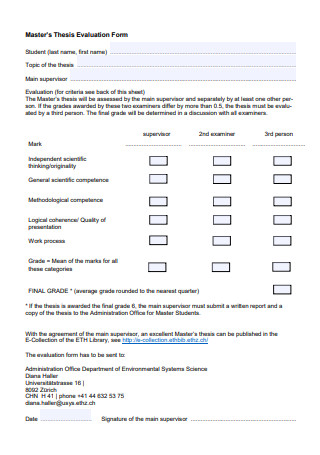
Master Thesis Written Evaluation Form
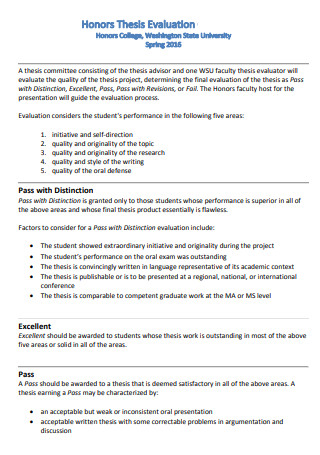
Honors Critical Thesis Evaluation
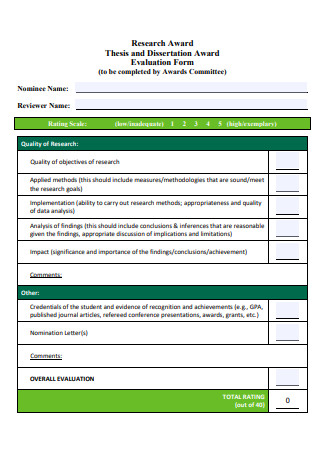
Thesis and Dissertation Award Evaluation Report Form
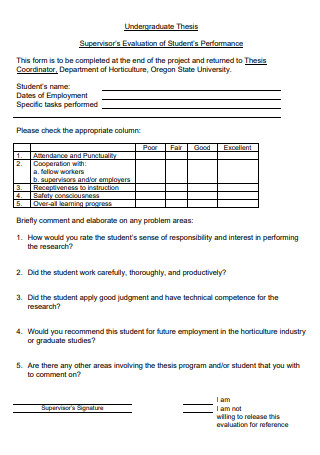
Undergraduate Thesis Supervisor Evaluation Assessment Form
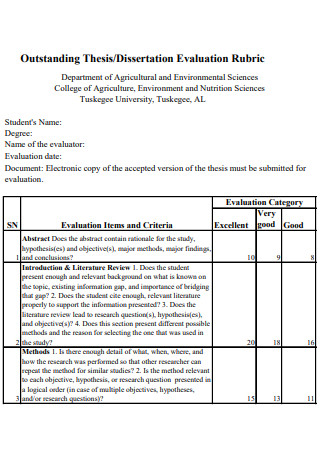
Outstanding Thesis Dissertation External Examiner Evaluation
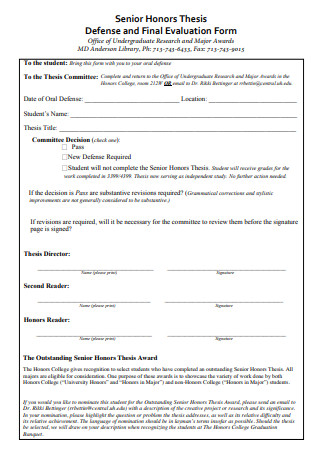
Senior Honors Thesis Defense Evaluation Criteria Form
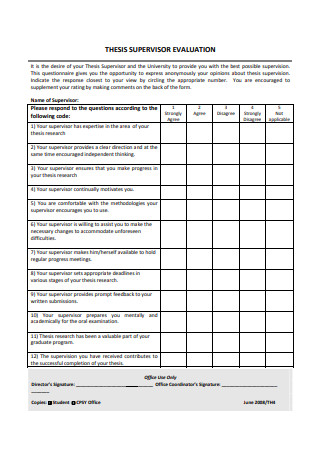
PhD Thesis Supervisor Evaluation
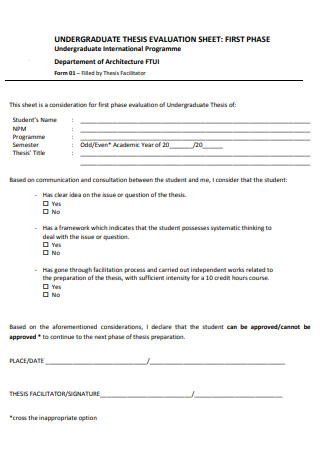
Undergraduate Thesis Evaluation Sheet
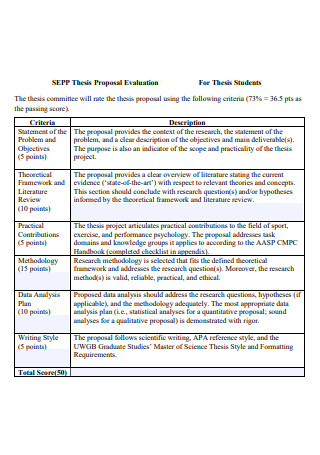
Thesis Proposal Evaluation For Students
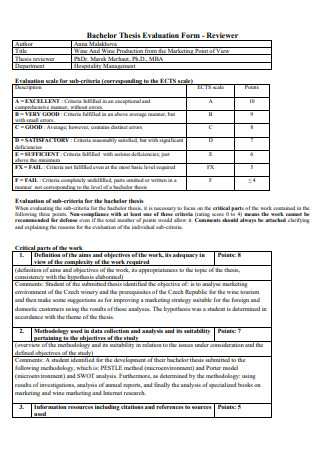
Bachelor Thesis Evaluation Form
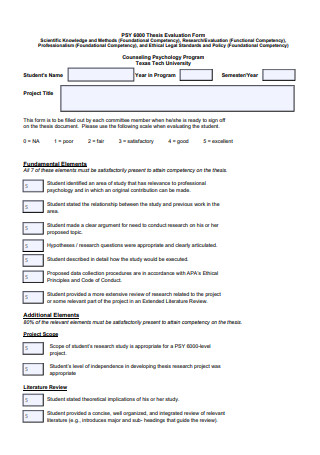
Thesis Evaluation Form
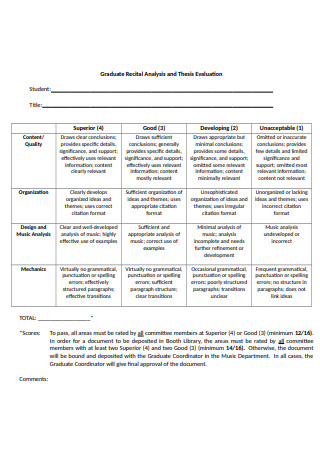
Graduate Recital Analysis and Thesis Evaluation
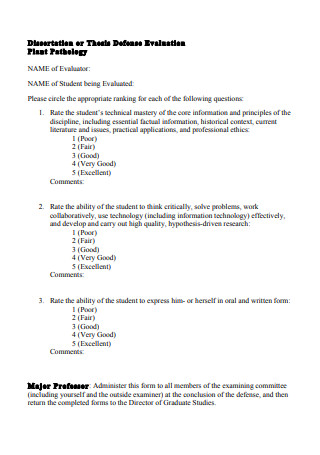
Thesis Defense Evaluation
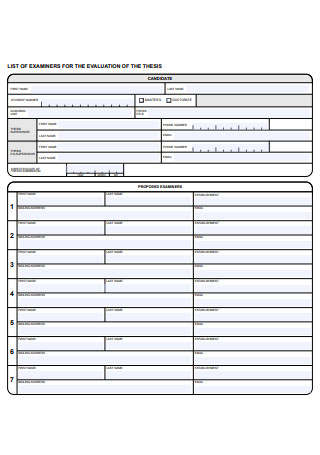
Thesis Evaluation of Examiners
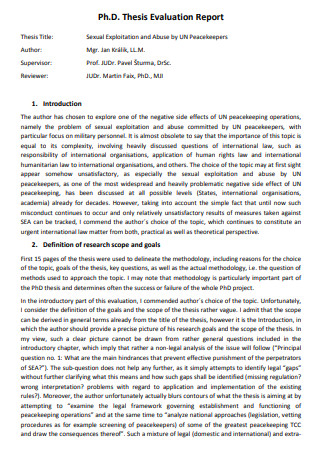

Thesis Evaluation Report
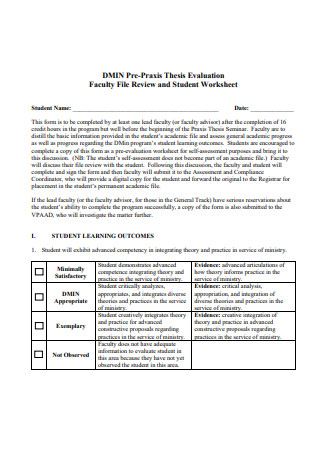
Thesis Evaluation and Student Worksheet
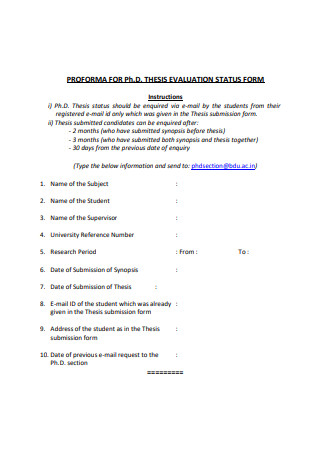
Thesis Evaluation Status Form
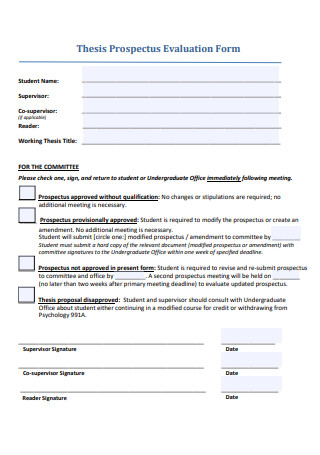
Thesis Prospectus Evaluation Form
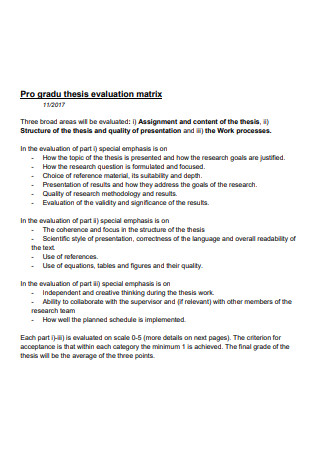
Thesis Evaluation Matrix
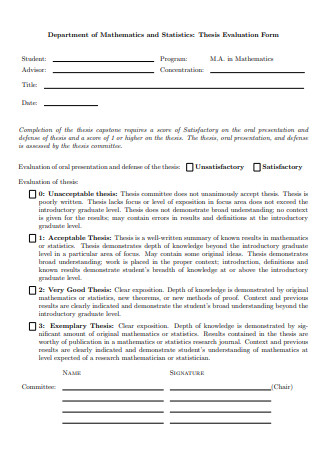
Department of Mathematics and Statistics Thesis Evaluation Form
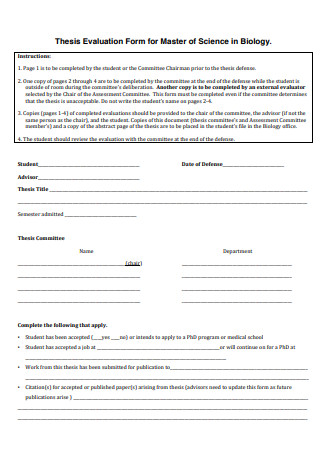
Thesis Evaluation Form For Master of Science in Biology
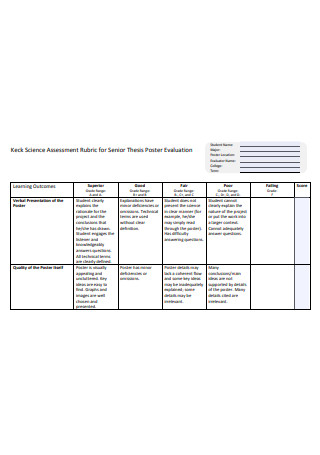
Senior Thesis Evaluation
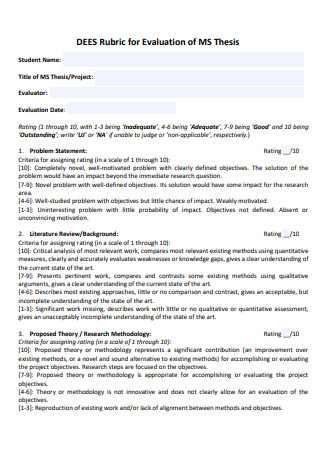
Basic Thesis Evaluation
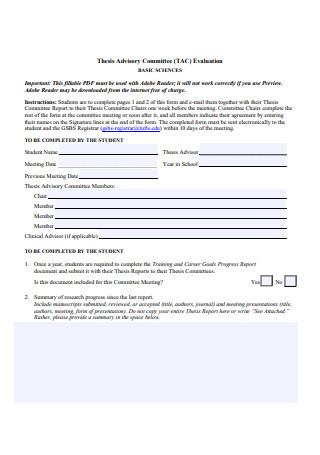
Thesis Committee Evaluation
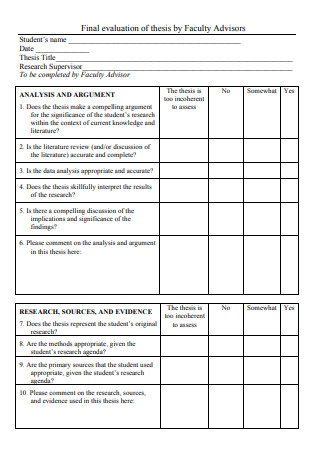
Faculty Thesis Final Evaluation
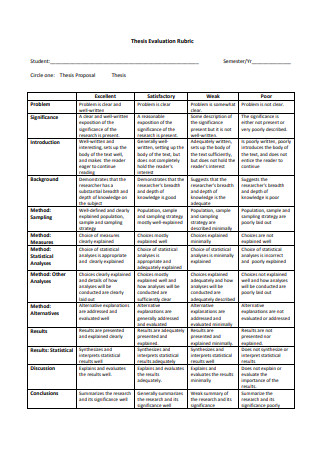
Thesis Evaluation in PDF

Thesis Dissertation Project Defense Evaluation
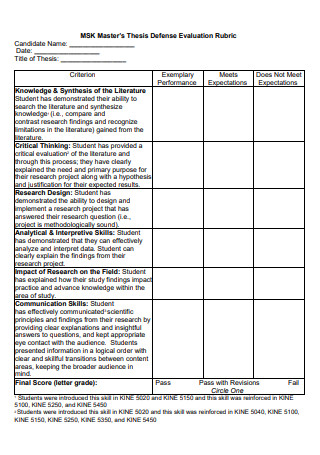
Master Thesis Defense Evaluation
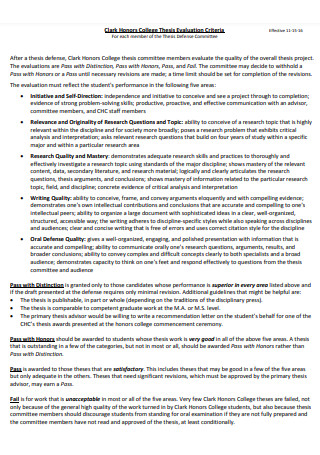
Honors College Thesis Evaluation
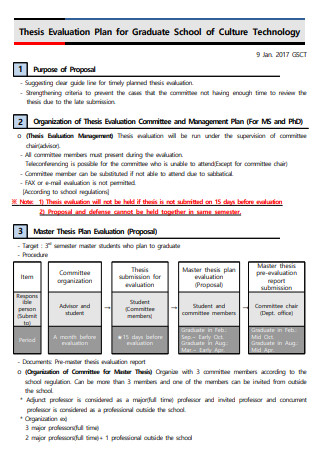
Thesis Evaluation Plan
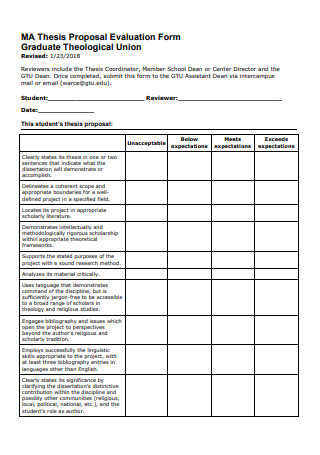
Thesis Proposal Evaluation Form
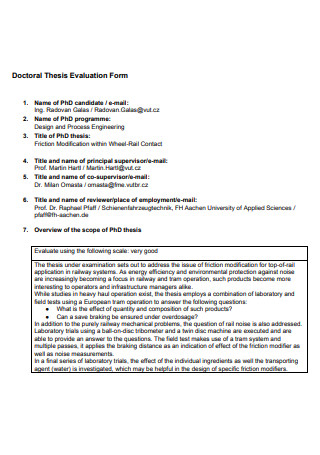
Doctoral Thesis Evaluation Form
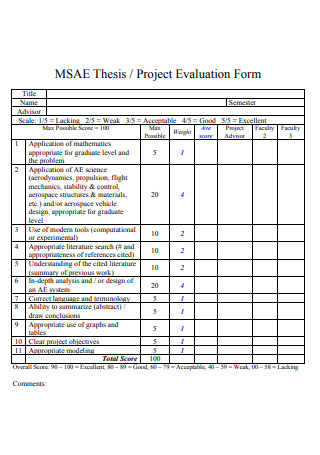
Thesis Project Evaluation Form
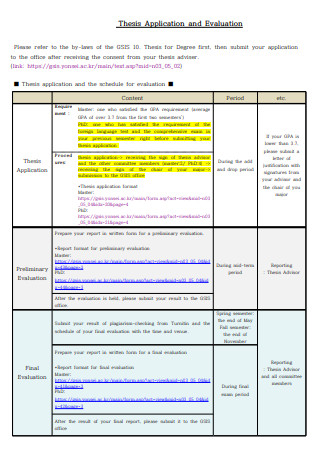
Thesis Application and Evaluation
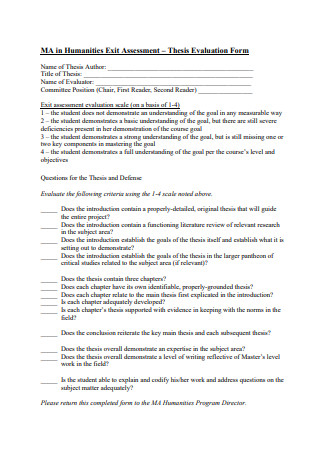
Humanities Exit Assessment Thesis Evaluation
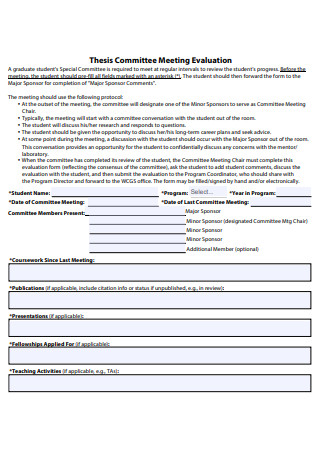
Thesis Committee Meeting Evaluation
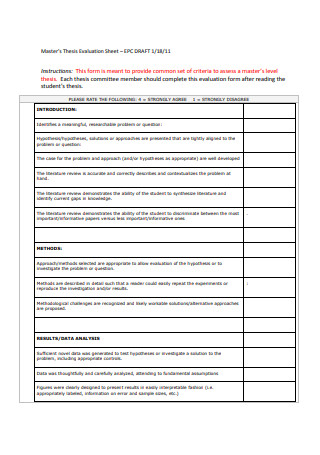
Master Thesis Evaluation Sheet
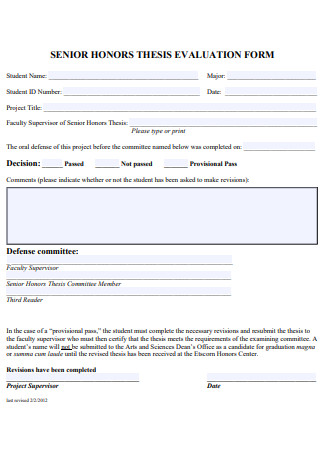
Senior Honors Thesis Evaluation Form
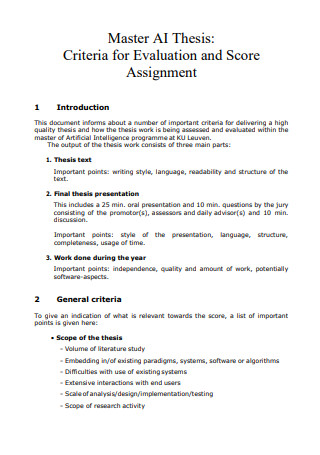
Master Thesis Evaluation and Score Assignment
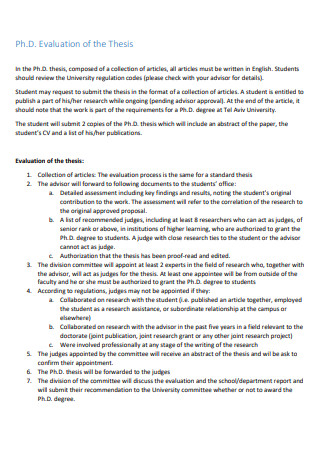
Thesis Evaluation Example
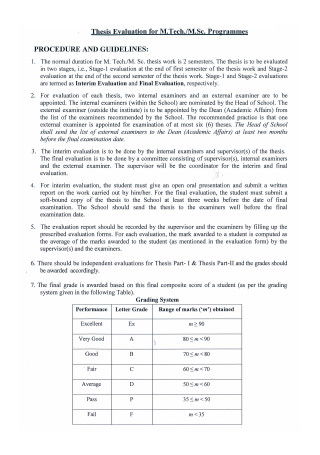
Programmes Thesis Evaluation
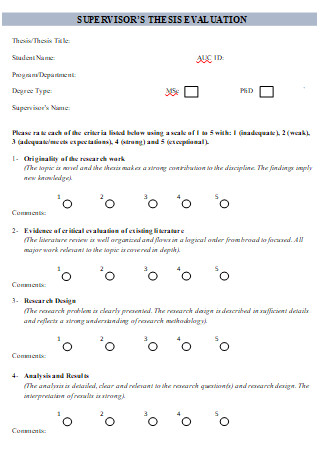
Supervisor Thesis Evaluation
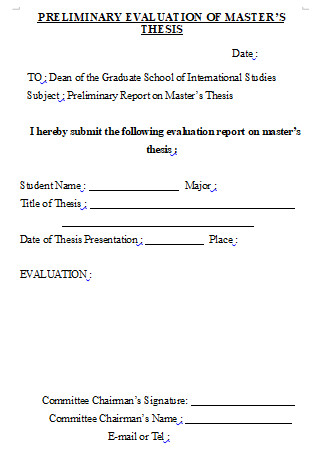
Master Thesis Preliminary Evaluation
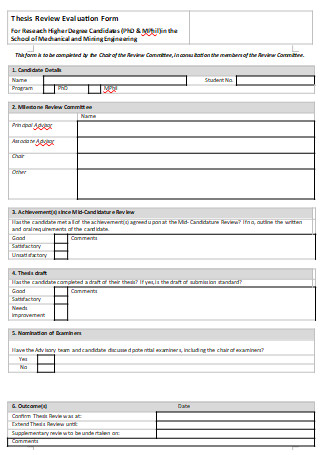
Thesis Review Evaluation Form
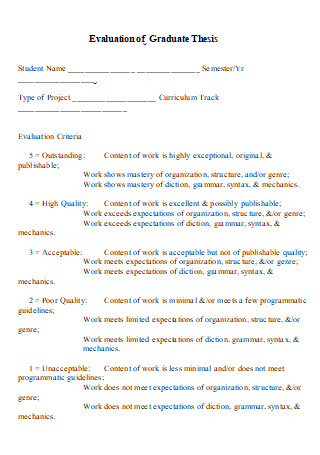
Graduate Thesis Evaluation
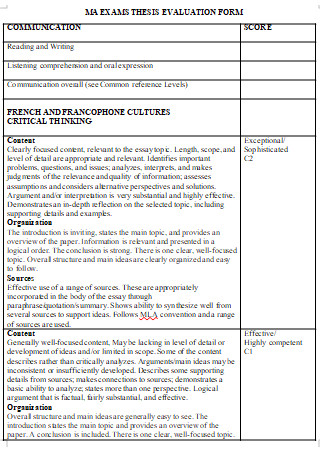
Exams Thesis Evaluation Form
1. bachelor thesis evaluation, 2. master thesis evaluation, 3. doctoral thesis evaluation, 1. maintains a clear analysis of thesis work, 2. facilitates organized decision making, 3. aims on a student’s overall performance, 4. provides summative comments , step 3: search for possible errors in a balanced way, what are some examples of thesis evaluation , share this post on your network, file formats, word templates, google docs templates, excel templates, powerpoint templates, google sheets templates, google slides templates, pdf templates, publisher templates, psd templates, indesign templates, illustrator templates, pages templates, keynote templates, numbers templates, outlook templates, you may also like these articles, 50+ sample internship evaluation in pdf | ms word.

Providing invaluable professional experience can be made through facilitating internships to potential individuals, allowing college and undergraduate students to test the concepts and theories that they learned throughout their…
39+ SAMPLE Probationary Evaluation in PDF | MS Word
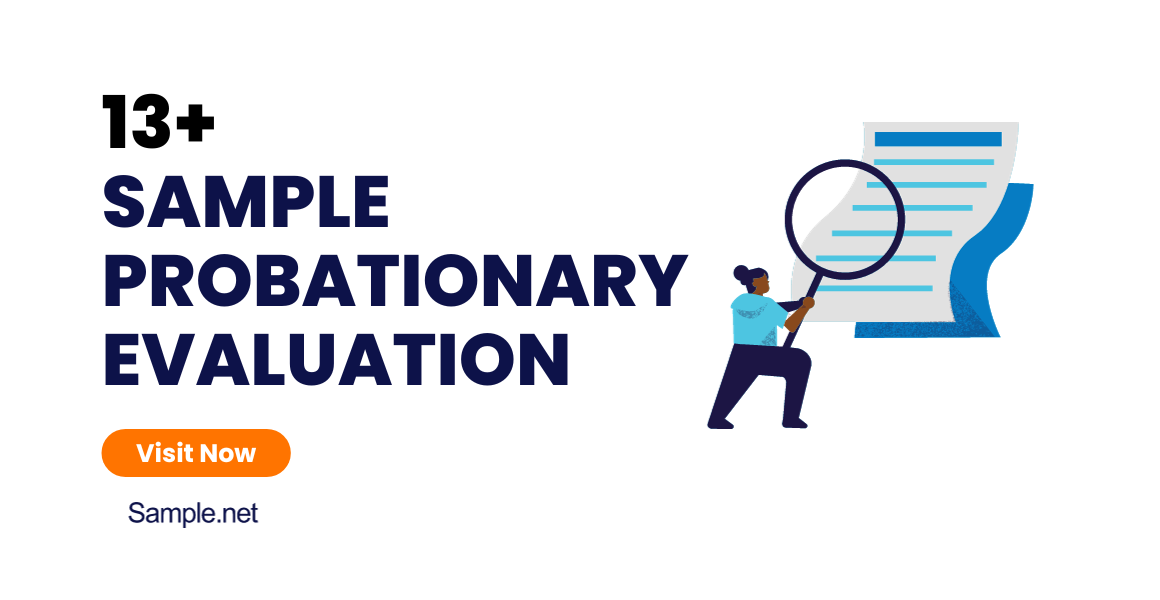
It is hard to find a job these days. There is a 5.6% unemployment rate in the US this year. Though Trade Economics has predicted that it would go…
browse by categories
- Questionnaire
- Description
- Reconciliation
- Certificate
- Spreadsheet
Information
- privacy policy
- Terms & Conditions
- Bibliothekssuche
- Mail-Systeme
- Digitales Lernen & Lehren
- Master´s Thesis
- Habilitation
Guidelines for the Master’s thesis
The master’s thesis is considered the final outcome of your master project and is also the most extensive scientific work of the study. The basis is identifying an appropriate topic, which is worked on independently, based on scientific theories and methods.
Below you will find important information and related references to the Master’s Framework Examination Regulations (M-RPO) regarding the individual steps before and during the preparation of a master’s thesis, as well as its assessment and evaluation.
You will find a summary of all the information in this downloadable PDF.
Before Registration
Before you register your master’s thesis, choose a topic that is related to your master's program and discuss it with your initial supervisor.
Important information before registration
Compensation for disadvantages.
If you are unable to complete all or part of the master’s thesis in the described form or within the deadline due to a chronic illness, a disability, pregnancy a/o maternity leave, you may apply for compensation for a disadvantage. Accordingly, the Master's Examination Committee may extend the processing time for examinations or the deadline (paragraph 10a and 10b of the M-RPO).
For this purpose, please contact the Diversity Officer ( Diversitätsbeauftragte ) of the University of Erfurt, who is supported by Department 1: Study & Teaching ( Dezernat 1: Studium & Lehre ), or the representative for Studying with Children before proposing the topic of your master’s thesis.
Language of the Master’s thesis
The master’s thesis could be written either in German or English. Should you want to write your thesis in a language other than the above mentioned, you will need to get your first supervisor’s approval before issuing the topic of the master’s thesis (paragraph 21 (6) of the M-RPO). In this case, the master’s thesis must contain a short summary in German as an appendix.
Joint-master’s thesis
The master’s thesis can also be written as a group thesis if its contribution could be assessed clearly and distinguishably. Further details are regulated by paragraph 21 (4) in conjunction with paragraph 21 (1) of the M-RPO.
Supervision of the Master’s thesis
Any professor or other person who is authorized to conduct examinations and hold a teaching position within your master's program can supervise the master’s thesis (paragraph 21 (2) of the M-RPO).
External second Supervisor
You have found a person who does not (regularly) teach at the University of Erfurt, but agrees to review your work? Then you can request the appointment of an external second supervisor. This person must have at least the university degree you are pursuing. Thus, it could be an expert from a company or another university, but their appointment must be justified and well-founded.
Formalities for appointing an external second supervisor
- Clarification of the importance and advisability of appointing an external second supervisor with the first supervisor.
- Submission of a written request to the M-Examination board ( M-Prüfungsausschuss ) stating why this external second supervisor would perform this task to the same extent instead of a professor, or another person authorized to examine at the University of Erfurt. This written application shall be co-signed by the first supervisor.
- Submission of the application along with the contact details of the second supervisor as well as the "Application for issuing the thesis’ topic".
The official form "Application for issuing the thesis’ topic" can be found here. Please use only this form for application. A translation help is given with this document .
In principle, students who wish to peruse their degree within the standard study period (four semesters) must “apply for issuing the thesis topic with taking into account that handing in the master’s thesis shall be one month before the end of the fourth semester at the latest.” (paragraph 21 (3) of the M-RPO).
Please note that you should submit your application as well as a current Certificate of Enrolment to the Dean's Office by the 15th of (each) month so that your thesis topic and the start of the processing period can be scheduled for the 1st day of the following month.
The topic and the supervisors will then be approved by the Master's Examination Committee and communicated to you in an issue letter . This letter will be sent to you by the dean's office via e-mail a few days before the start of the processing period. Your confirmation of this letter is required so that the corresponding link can be activated in WISEflow and sent to you.
During the Master's thesis processing period
The deadline for submitting your master’s thesis is 5 months starting from the day you will be notified with the issue letter (paragraph 21 (5) of the M-RPO). As a rule of thumb, the length/word count of the master thesis should not exceed approx. 25,000 words. You should thus keep the topic appropriately brief to fit into the given word count.
The work must contain (from a purely formal point of view) the following elements:
- table of contents,
- list of sources/bibliography,
- page numbers,
- references.
The requirements of any other scientific work apply (Research question(s), research interest, state of research, theory, results, conclusion/further research…etc.).
Further remarks
Return or change of thesis’ topic.
The topic can only be returned once and only within two months after the issue of the master thesis’ topic (paragraph 21 (3) of the M-RPO). For this purpose, please send an informal letter with a short justification to the M-Examination Committee ( M-Prüfungsausschuss ) and submit it via the Dean's Office.
Changing the thesis' topic of the thesis is only possible in justified exceptions. For this purpose, a written request with reasons must be submitted to the Master's Examination Board no later than 4 weeks before the submission deadline (final deadline). This request requires a written statement from your supervisor. Adding an (additional) subtitle is possible at any time without an application. However, this addition will not (!) be shown on the certificate.
Extension of the Deadline
In case you are unable to submit on time due to an illness, you must immediately submit the sick leave notification to Department 1: Study & Teaching (Dezernat 1: Studium & Lehre). For this purpose, it is mandatory to use the given form.
If the inability to work on the thesis is recognized, the Deadline will be extended according to the respective number of days of illness or delay. After processing the documents received by the Dean's Office for this purpose, students receive a letter with the recalculated deadline.
Submission of the Master’s thesis
To verify that the submission deadline has been met, the date of receipt of the digital submission via WISEFlow applies.
On the day of submission, you upload your digital master thesis as a PDF file via the platform WISEflow . This file must not exceed a size of 20 MB and must (formally) contain the following:
- list of sources and bibliography,
- page numbers
Please make sure that no conclusions can be drawn about your name or address here (personal data - data protection) - i.e. do not insert the title page or declaration of independence in this document!
The the title page, the valid Certificate of enrolment and the declaration of independence signed by hand in blue must be uploaded in WISEflow as separate files under " Anhangsmaterial "; and furthermore, additional files with attachments or appendices (video recordings, statistics files, etc.) may be uploaded here - these files together must not exceed the size of 1 GB .
After that, you also add the automatically generated cover sheet in WISEflow.
As a last step, click on the "Click here to submit" field in WISEflow to complete the submission. After that, you can download a receipt for yourself and print it out if necessary.
If requested by your examiner(s) , please submit one/two bound printed version(s) of your master thesis to the Dean's Office no later than 3 days after submitting your thesis in WISEflow.
Evaluation of the Master’s thesis
After submitting your master’s thesis in due time, the Dean's Office will send it to the respective supervisors. The deadline for the evaluation procedure is based on paragraph 22 (2) of the M-RPO.
The master's thesis will be reviewed by two supervisors and evaluated in accordance with paragraph 15 (3) of the M-RPO. If the grades of both appointed supervisors differ by 2.0 or more, or if one of the two supervisors assesses the thesis as "insufficient", the thesis is to be assessed by a third examiner (paragraph 22 (2) of the M-RPO).
You will receive your grade certificate by mail shortly after the receipt of all experts‘ reports. The Dean's Office will then automatically forward a copy to Department 1: Study & Teaching ( Dezernat 1: Studium & Lehre ).
Second Attempt of Master's thesis
The master’s thesis is deemed not to have been passed if you do not complete your thesis within the deadline of the Master Examination Board or if the two supervisors rate your work as "insufficient" (grade 5.0) (paragraph 23 (2) of the M-RPO).
If the master’s thesis has not been passed for the first time, it can be repeated once on a different topic. A change of the topic of the master’s thesis is only permitted if you did not make use of this option when writing the first master’s thesis (paragraph 21 (3) of the M-RPO). The application can be submittd by the 15th of (each) month (the processing time starts on the 1st of the following month).
If the master’s thesis is also not passed in the second attempt, the right to be examined expires. If you lose your right to take an examination, you will be de-registered (ex-matriculated) (paragraph 23 (2) of the M-RPO).
Contact person
Office hours.
Appointments for the submission of applications and printed Master's theses are possible by individual arrangement. Appointments and confirmations are made after e-mail request.
- Emergencies and complaints
- Merchandise
- Manage own data
- People search
- Travel information and addresses
- Diversity and Inclusion
- Certificates and memberships
We are part of the "Weltoffenes Thüringen" initiative

Social Media Channels

- Social Media
University of Erfurt (Campus) Nordhäuser Str. 63 99089 Erfurt
- Accessibility declaration
- Privacy Policy
- Legal notice

IMAGES
VIDEO
COMMENTS
This guideline is intended for master's thesis writers, advisors, supervisors and the approving authorities. Section 2 describes the general characteristics and objectives of a master's thesis. The evaluation of the master's thesis and the grading decision shall be based on the criteria listed in section 3. The chart presented in this ...
Evaluation of a Written Thesis. Examiners are asked to evaluate the thesis in myThesis, according to the criteria in the respective thesis examiner report for a Master's or Doctoral thesis. For an example of the criteria, please see the forms: see: Master's Examiner report form; Doctoral Examiner report form (note these forms are now integrated ...
Short definition of a Masters thesis 1. A masters thesis is an initiation into serious experimental research. A good thesis shows that the writer can produce an extended piece of work, in perfect English, which respects the standards of form and structure. The master's thesis is a carefully argued scholarly paper of approximately 12,000 ...
A master dissertation (or MA thesis) is a piece of independent and original research carried out by MA students under faculty supervision. It addresses a (set of) research question(s). ... The evaluation criteria include: Originality, clarity and strengths of your research design; clarity in framing the issues,
The thesis is a mandatory synthesis activity that counts for 24 credits in the Master of Science (MSc) Program (45 credits). It consists in undertakinga structured and rigorous research project in a particular field that enables the student to improve her knowledge in a specific field in business. The thesis can be devoted to a
Master's Thesis Guidelines . 1. Preamble and learning goals. The Master's thesis concludes the Master's degree programme in Science, Technology and Pol- ... The supervisor and co-supervisor are free to submit separate evaluation forms or a jointly filled in form. A Master's thesis that receives a grade lower than 4 may be repeated once ...
A master's thesis is required by some programs, and a master's capstone project/experience is required in others. Each master's degree student undergoes an individual evaluation process at the end of their program. ... including time, date, and title of the public presentation. The format for thesis evaluation is decided by the academic ...
Thesis supervisors are encouraged to familiarize students with the Guideline for Master's Thesis Evaluation as soon as they start working on the master's thesis. The thesis supervisor submits a written statement on the thesis, i.e. evaluation report, with a proposal for a grade to the Degree Programme Committee.
Master's students must submit a service request through uoZone four weeks before submitting their thesis for evaluation, failing to do so will delay the evaluation process. This request must include the following document: The List of examiners for the evaluation of the thesis form that includes at least two eligible internal examiners.
Master's thesis evaluation committees have a minimum of three members. In cases where the research supervisor is also the program director, the vice dean of studies at the faculty in question assumes program director duties for the purposes of the Master's thesis. If you have a co-supervisor, FESP recommends the appointment of a fourth examiner.
Written evaluation of master's thesis with oral defence and verdicts: See regulation C-7.10.2 of the Academic Regulation on thesis. Written evaluation of a doctoral thesis and verdicts: See regulation C-7.10.2 of the Academic Regulation on thesis. For theses with an oral defence component, the thesis will be evaluated and then defended in ...
Microsoft Word - Master's Thesis Evaluation Sheet_DA.docx. Master's Thesis Evaluation Sheet - EPC DRAFT 1/18/11. Instructions: This form is meant to provide common set of criteria to assess a master's level thesis. Each thesis committee member should complete this evaluation form after reading the student's thesis.
Master Thesis Evaluation Seattle University External Examiner's Report - Page 4 When you are ready to submit your review, you may save this report as a Microsoft Word (or RTF) file, or as a PDF file and then upload to [email protected] If you have any questions, please contact Erica Rauff at (206) 296-2045 or [email protected]
The research requirements of the program can be accomplished either as bench- or field-based research, data analysis, a literature-based research, or co-writing a research proposal with the PI.Students must complete at least 24 units of research over a two years period that includes both the BS and the MS parts of the program (BISP193/196/199 and BGGN 271).
research in an academically sound way. The master thesis and research methods course together count for up to 20 EC and form an integral and important part of all MSc pro grammes. This manual gives detailed requirements for the structure, content, and assessment of the master thesis.
The Master's thesis is a formal document whose purpose is to demonstrate the candidate's ability to make an original contribution to knowledge. To this end, it must ... 1.4 Defence and evaluation . 1. The Master's thesis is examined orally before a panel comprising the supervisor, another Faculty member (the co-examiner) and the Master ...
Master's thesis evaluation. In our faculty, your master's thesis is evaluated on three aspects: 'process' (40%), 'dissertation' (30%) and 'presentation and defence' (30%). The evaluations of these aspects (taking into account their specific weight) will be converted into a final grade, rounded off to one decimal place.
A master's dissertation must be developed based on a comprehensive research conducted in accordance with the "Code of Conduct for Scientists at Hokkaido University." 2. Structure of Dissertation. A master's dissertation must fulfill the following requirements: Provide an adequate title. State research background and a research aim clearly.
Master thesis. The evaluation level of the degree thesis is determined by the EQF level 7, which establishes requirements on. highly specialised knowledge as the basis for original thinking and research; awareness of knowledge issues in a field and at the point of contact between the different disciplines;
A master thesis evaluation is an examination of a thesis which appears to be smaller in scope compared to a dissertation or thesis and more focused on an applied research problem. Thus, a thesis evaluator should check the student's master thesis if the scope of research has been defined and the goals of the thesis are evident.
Evaluation of the Master's thesis After submitting your master's thesis in due time, the Dean's Office will send it to the respective supervisors. The deadline for the evaluation procedure is based on paragraph 22 (2) of the M-RPO. The master's thesis will be reviewed by two supervisors and evaluated in accordance with paragraph 15 (3) of ...